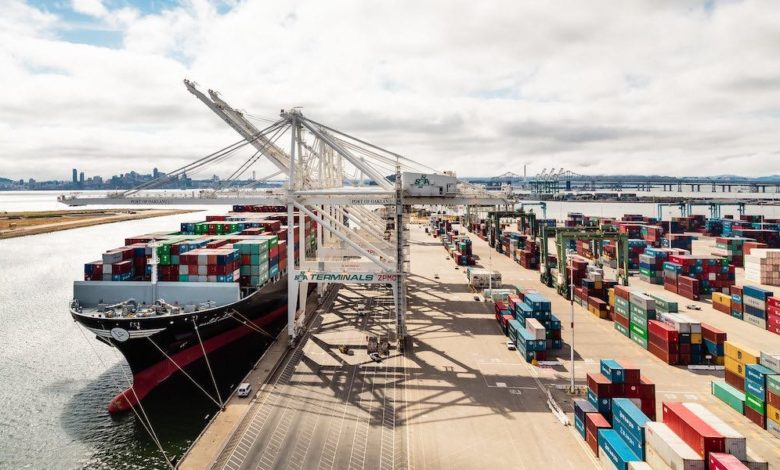Oakland pitches for boxes as other North American terminals clog up again

Just like the ebbs and flows of tides, congestion is back up at many of North America’s top gateways leading one opportunistic port to pitch for more work.
Once again there are more than 70 container vessels in the water outside Los Angeles and Long Beach, showing that the gradual improvement over the past few weeks has been undone.
Yesterday German carrier Hapag-Lloyd issued its North America operational update in which it noted that efforts to get the southern Californian ports running 24/7 had not been taken up greatly.
Imports are waiting for an average of six days for a truck to pick up, and street dwells are up to nine days on average. Import rail dwell is up to 14 days in the terminal complex, Hapag-Lloyd stated, statistics that will alarm the White House, which has made considerable efforts to intervene in the snarl-ups seen at the nation’s ports this year.
Congestion in the south of the state has prompted a rival up north to trump its available berth spaces this week.
The Port of Oakland said yesterday that its terminals are congestion-free, and it is calling on carriers to reroute cargo there from other, busier ports. In particular, it is looking to shipping services that have bypassed Oakland since the summer to return to the port.
“There’s no congestion at the Oakland seaport, and we’re ready for more business,” said Bryan Brandes, the port’s maritime director. “We need ocean carriers to reinstate services in order to stabilize the supply chain, and our import and export partners echo this sentiment.”
The port, which reported it hasn’t experienced vessel backlogs since August, said shipping lines can help ease the gridlock affecting US supply chains by steering ships back to Oakland.
Fifty-four vessels stopped in Oakland last month, the lowest vessel call total since 2015. As a result, September import volumes declined 13% year over year, and exports fell 18%.
“We have capacity in Oakland that needs to be put to use to help shore up the supply chain and support our economy,” said Brandes.
Elsewhere in North America congestion is mounting. Berthing delays in Seattle are up to two weeks, Hapag-Lloyd warned yesterday while in Canada, the port of Vancouver is having to contend with record traffic volumes with the Canadian International Freight Forwarders Association (CIFFA) suggesting the current cargo traffic surge amounts to 15% more than normal per day. To Canada’s east, Hapag-Lloyd warned that the labour situation in Montreal continues to negatively impact timely operations of vessels.
In Houston, meanwhile, the port is currently limiting vessel discharges so as not to overwhelm container operations with Hapag-Lloyd reporting the Texan port is experiencing critical equipment shortages for chassis, gensets and reefer plugs while labour shortages continue in Houston for crane operators and occasionally truck drivers.
It is at the port of Savannah, however, where some of the most severe liner disruptions are being reported. Ships are delayed up to eight days on average awaiting berth assignment at the Georgia port with the new first come, first served policy, which started at the end of August, making no difference thus far according to Hapag-Lloyd.
Alphaliner is reporting that several carriers have decided to temporarily remove Savannah from their rotations due to heavy congestion. Some 30 ships are currently waiting at anchor for a berth at the east coast port.
